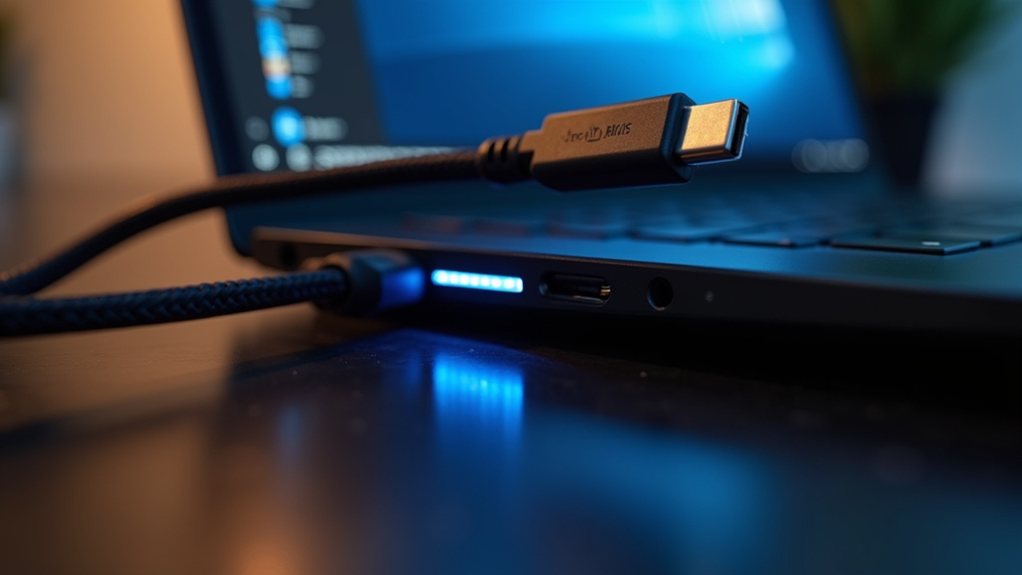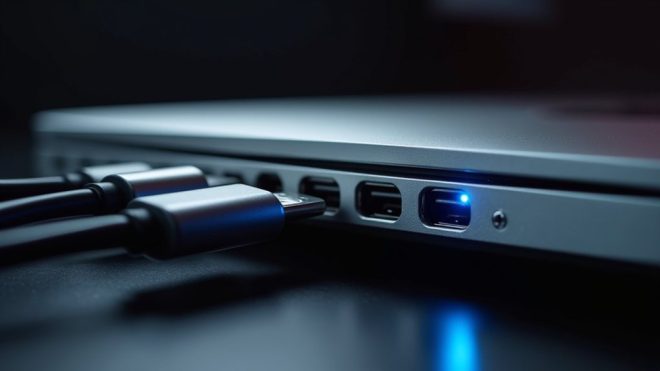Microsoft is pushing OEMs to fix USB Type-C notification issues in Windows 11, addressing widespread concerns about device safety and charging reliability. The tech giant’s demands stem from problems with port detection, charging specifications, and ACPI markup implementation that can lead to hardware damage and poor user experience. Through stricter compliance requirements and the Windows Hardware Compatibility Program, Microsoft aims to standardize USB-C behavior across devices – an essential step as the connector becomes increasingly central to modern computing.

Microsoft’s latest push to improve USB Type-C reliability in Windows 11 signals a significant shift in how the operating system handles port-related issues. The tech giant is taking a firmer stance with OEMs, demanding they address configuration problems that prevent vital USB-C notifications from reaching users – notifications that could mean the difference between peak performance and potential hardware damage.
The stakes are particularly high given USB-C’s central role in modern computing. This versatile port handles everything from high-speed data transfer to video output and power delivery, making proper notification systems fundamental for maintaining device health and user experience. When these notifications fail, users remain unaware of significant issues like slow charging or incompatible accessories until problems escalate. OEMs must carefully consider security policy toggles when implementing USB-C features to protect data in untrusted environments. The absence of proper notifications has led to increased support burdens for IT departments worldwide.
At the heart of these notification failures lies a complex web of technical mishaps. OEMs have struggled with proper ACPI markup implementation, sometimes mislabeling ports or incorrectly marking accessible ports as internal. These seemingly minor errors can have major consequences, preventing Windows from accurately detecting USB-C ports and delivering important alerts about potential issues.
To combat these problems, Microsoft has established strict compliance requirements through its Windows Hardware Compatibility Program. OEMs must now validate their USB port descriptors using the Windows Hardware Lab Kit and guarantee their USB-C ports support standardised charging specifications, including a minimum 15-watt power delivery capability. These requirements aren’t just bureaucratic red tape – they’re vital safeguards for maintaining consistent user experiences across the Windows ecosystem.
The notification system itself is sophisticated, leveraging USB Power Delivery specifications to monitor and alert users about inadequate charging conditions. When a power source delivers less than the expected wattage, Windows 11 quickly notifies users, potentially preventing long-term battery degradation or charging inefficiencies.
Systems equipped with UCSI capability benefit from even more streamlined notification management through the built-in UCM-UCSI ACPI client driver. Microsoft’s insistence on using Windows’ built-in functionality for these notifications, rather than third-party solutions, highlights their commitment to standardisation. This approach guarantees consistent alert behaviour across different manufacturers and models, eliminating the fragmentation that often plagues Windows devices.
For users, this renewed focus on USB-C reliability couldn’t come at a better time. As devices become increasingly dependent on USB-C for critical functions, the importance of proper notification systems grows exponentially. Microsoft’s pressure on OEMs represents more than just quality control – it’s a necessary step toward guaranteeing Windows 11 devices can reliably serve users in an increasingly USB-C-centric world.
Final Thoughts
Microsoft is advocating for standardized USB-C notifications to enhance the user experience on Windows 11. By urging OEMs to provide consistent alerts, Microsoft aims to reduce confusion surrounding charging, data transfer, and device connectivity. This move represents a shift in Microsoft’s role from merely being a software provider to becoming a curator of the entire ecosystem, ensuring that Windows users receive clear and useful information about their USB-C connections across various devices.
If your business is looking to implement these advancements or needs assistance with Windows 11 services, Home Computer Technician is here to help. Don’t hesitate to reach out! Click on our “Contact Us” page to get in touch with our team today.

